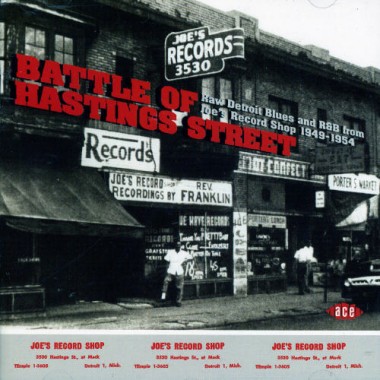
CD cover of “Battle of Hastings Street”, Ace Records, Ace Records.com. Original photo by Jacques Demetre, 1959
My father, the late Joe Von Battle, was an important mid-century recorder and producer of blues and gospel music in Detroit, from 1945 until 1967. He has been called the “Chess of Detroit”, referring to the iconic Chicago Record company, and is regarded by many as a cornerstone in the building of the “Detroit Sound.”
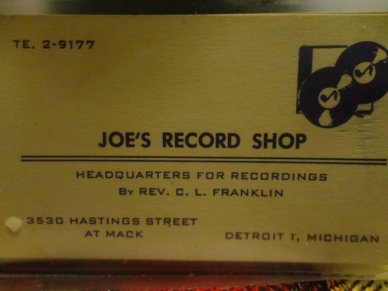
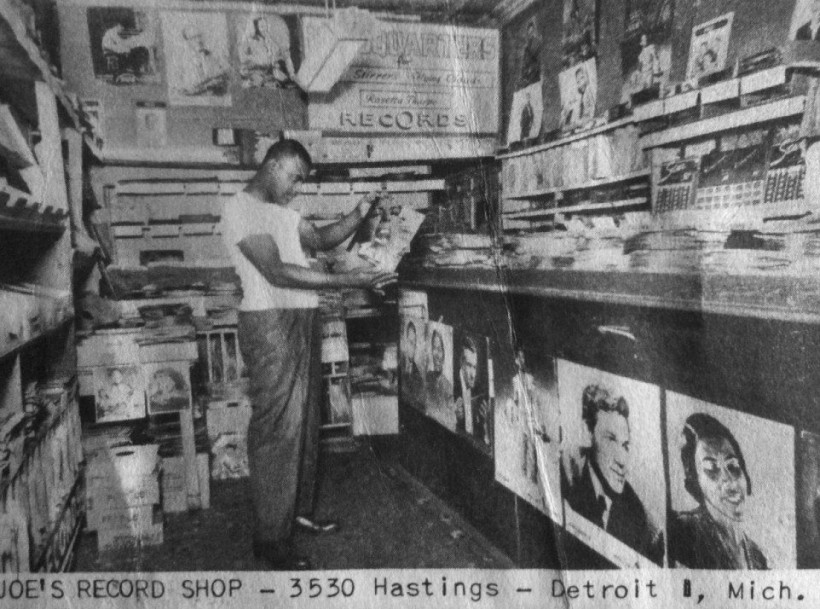
Over the years he recorded legendary artists such as John Lee Hooker, Little Willie John, Johnnie Bassett, the Violinaires, the Serenaders, Little Sammy Bryant, Little Sonny, Jackie Wilson, Sonny Boy Williamson III (aka Rice Miller), and many, many others in his studio in the back of the shop, including a classic called The Hucklebuck by Paul Williams.
He even recorded a Civil Rights song “The Alabama Bus,” by Brother Will Hairston (backed by Washboard Willie), an obscure but significant Blues chronicle of the Alabama Bus Boycott (more on this historic record on another page of this website, see index).
After coming to Detroit from Macon Georgia, Joe worked for a while at the Eastern Market and dug ditches for the gas company. He later worked at the Hudson Motor Car Co. and, for a time, worked two jobs, like many Detroiters in those times – after the end of his shift at the Hudson plant, he’d walk across the street to work at Chrysler for another 8 hours. At the end of WWII, he became one of the last hired, first fired after G.I.s came home from the war; the whites returned to their jobs, displacing the black workers who had been “last hired” during the war. He was let go from his factory job – and Joe Von Battle vowed he would never again “work for another man.”
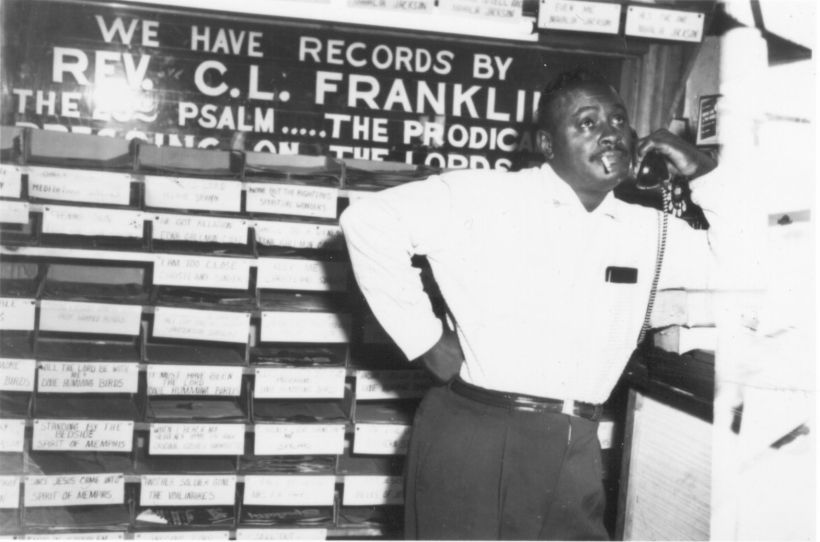
Joe Von Battle, in the front of Joe’s Record Shop. Approx. 1953. Photo by Joe Von Battle Jr. (?)
In fact, this belies the popular fiction that those from the projects – like Diana Ross – had a hardscrabble upbringing during those times. For the projects – in those days of segregation in the North – were filled with upwardly mobile working folk, who had moved up from the crowded, substandard housing of the Black Bottom area that was teeming with folks who’d come up from the South. In fact, the Detroit Race Riot of 1943 was instigated by the intense competition over housing in the city, which exploded into violence when whites tried to stop blacks from moving not the Sojourner Truth Projects on the near East Side.
As a young man in Georgia, Joe Von Battle had been a licensed African Methodist Episcopal Minister in training, going from church to church, listening to preachers and learning about the ministry. But, after living in Detroit, he became deeply disallusioned during an episode of quarantine for suspected tuberculosis (that turned out to be pleurisy of the lungs).
When released, many months later, he had lost all, and had to begin anew to find a way to support his family. This is a little recounted part of Detroit’s history, in which Blacks and the poor lost income and property in abrupt, sometimes premature diagnoses. This was often due to crowded living conditions and a lack of available health care, especially in Black Bottom. These patients often endured demoralizing quarantines for months and even years.
My father abandoned the ministry, though his affinity for sermonizing and gospel music was to endure, taking the form of recording the preaching and singing of others. He produced the Rev. C. L. Franklin, Rev. Cleophus Robinson, Rev. Jelks, Bro. Willie Hairston, the Violinaires, and others.
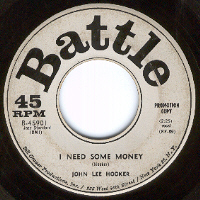
Battle label 45 record, “I need some Money”; by John Lee Hooker. Photo from jlhvinyl.com
Down Hastings Street was New Bethel Baptist Church, and Joe Von Battle began hearing about the extraordinary preaching of the Reverend C.L. Franklin (father of Aretha). Reverend Franklin’s church services were played live on radio and heard far and wide in the Detroit area and beyond; he was already regarded a phenomenon – “a preaching machine.” My father heard about Franklin’s gifts as preacher and singer, and he began visiting the church to hear “the man with the million dollar voice.”
Soon Joe was recording Rev. Franklin’s Sunday night sermons and songs, mostly on the Battle and Von labels. Joe Von Battle was the sole producer/recorder of the sermons of Rev. Franklin, and this was a relationship – and friendship – that was to last through 75+ albums and records, for many years.
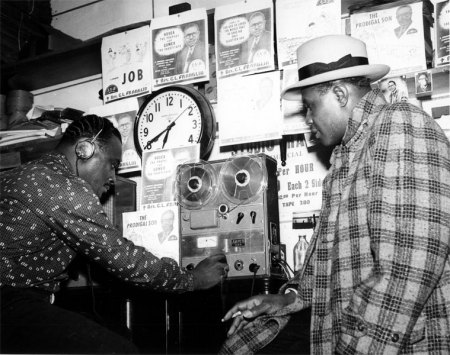
Joe Von Battle, left, and Rev. C.L. Franklin, right, in Joe’s recording studio in the back of the record shop. Franklin began recording with Joe in 1953.
Joe Von Battle was the first to record the voice of Aretha, Franklin’s daugher, as she sang in the New Bethel Baptist church choir. He produced her first record, the gospel song, “Never Grow Old” when she was 14. He produced many of her gospel songs before she moved to the larger record labels to sing secular music.
My father initially released and distributed the records himself, mailing them all over the country as demand for them increased. After a time, the songs and sermons of especially Rev. Franklin were mainly released and distributed by Chess records, where my father had numerous recording and financial arrangements.
Many of his Blues recordings were regarded as simple, even crude, done as they were on a basic machine in the back of the storefront, with it’s simple microphones and an old upright piano. Many a night after church, Ms. Aretha sat playing that piano and having a good time with my older half-brother and three half-sisters, who worked at the shop with my father (in later years, my brother and I surely plunked that old instrument out of tune). Joe’s recordings of Rev. Franklin’s sermons, done at the church, were clear and electrifying, capturing the excitement of Rev. Franklin’s choir and church services.
My father would play Rev. C.L. Franklin records through loadspeakers onto the street, and passersby would gather in great crowds to hear the sermons and psalms; the police often came to control the crowds. The very idea of throngs gathered, enthralled, listening to Gospel music, surely flies in the face of the reputation of Hastings Street as only a “red light district”.
Musicians from far and wide found their way to Joe’s Record shop. Today, the remaining Blues and “religious” records that he recorded are repositories of an important part of the history of early R&B and modern Gospel. They are pure, raw and unadorned by later contrivances and techniques.
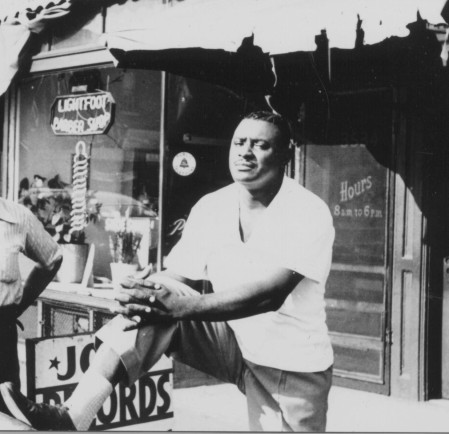
Joe Von Battle, in front of his record shop and the barber shop next door. Photo by Joe Von Battle Jr.
By the 50’s my father was famous in Detroit and beyond for his record shop/studio on the infamous Hastings Street. Hastings, starting at Gratiot in Black Bottom, and running North until West Grand Blvd., was a thriving, intense commercial center, as well as an entertainment district.
It was a teeming part of the Detroit metropolis, with people of various European ethnic backgrounds and businesses, Jewish folks and Blacks. In fact, it was the center of African-American business in Detroit, with Blacks owning pharmacies, grocery and furniture stores and the like.
[From my article on this site, John Lee Hooker – No Magic, Just Man: One day in 1959, a photographer – Jacques Demetre and a writer, Marcel Chavaud; came to the United States from France; they were writing a book about the Blues – and they stopped in three cities – Chicago, New York and Detroit. When they got to Detroit, they went straight to Joe’s record shop, as they had heard that it was the place for the Blues.
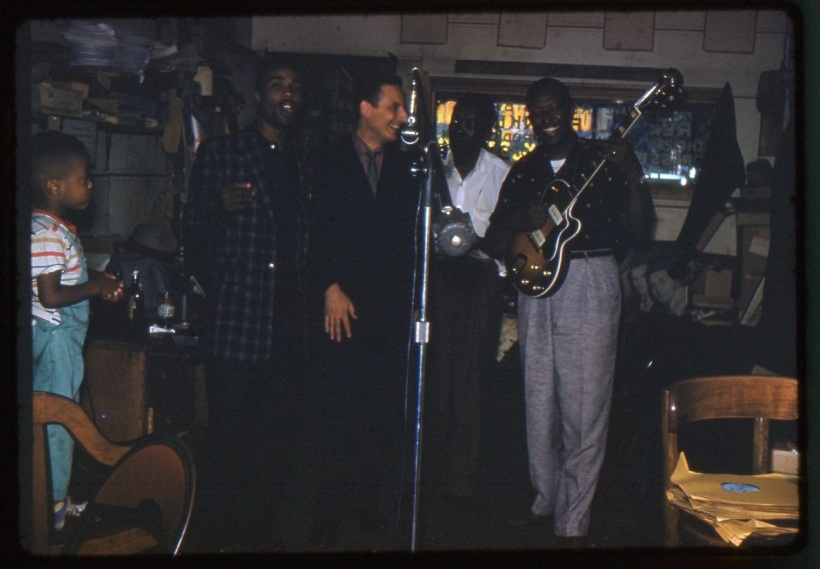
My younger brother, Darryl Battle, looks on at Aaron “Little Sonny” Willis, Jacques Demetre, John Lee Hooker and Emmett Slay.
When they arrived, my father picked up the phone and called his friend Aaron Willis, aka Little Sonny, and told him to come over; there was a man from France come to take pictures of the men of the Blues. He made another call too, and when he came from around the corner of Mack, onto Hastings and into the shop too, my older brother Joe Jr. says that the French photographer almost fainted, he was so astonished and delighted to see the already legendary Bluesman – John Lee Hooker – come into view.
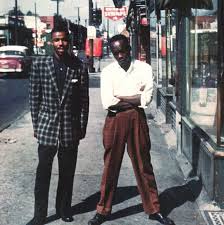
Aaron “Little Sonny” Willis and John Lee Hooker, in front of Joe’s Record Shop. Photo by Jacques Demetre, 1959.
Demetre snapped John Lee Hooker in front of the record shop (above) and eventually, the photo that he took became an iconic album cover; John Lee, dapper in slacks and white shirt, posed with his guitar on the sidewalk in front of the record shop, in the same spot where my father, mother and her sisters always stood for photos back in the day.
The camera faces North, up Hastings Street; the spire of St. Josophat on Canfield is in the background on the left. Hastings is long gone, most of it is a freeway service drive now, but that church is still there, one of the few remaining structures adjacent to Hastings St., from back in those days.
Aaron “Little Sonny” Willis, Joe Von Battle, John Lee Hooker, Emmitt Slay. Photo by French photog Jacques Demetre; writer Marcel Chauvard in background.
Several amazing Blues photographs came from that shoot. Some of them were in amazing color for the time. As of this writing, photographer Jacques Demetre is still alive in France – a nonagenarian – and remembers his long ago visit very well – and my brother, Joe Jr. almost 80, recounts it like it was yesterday.
Joe Battle Sr., Joe Battle Jr. and Floyd Taylor. In front of the Hastings St. record Shop. Photo by Jacques Demetre, in rare color for the time, 1959.
Berry Gordy would come and talk “record talk” as he began his own fledgling company at the house on The Boulevard (i.e. West Grand Boulevard) that he was to call Hitsville. Many Motown artists visited the shop for a good conversation and a “taste” in the back room. Artists such as Mary Wells, bassist James Jamerson and other Funk Brothers, and many others “hit a lick” at Joe’s Record Shop, and many recorded there.
Daddy’s record labels were “JVB“, “Von” and “Battle“, Gone, Viceroy and perhaps more, as well as subsidiary arrangements with several labels such as King and Deluxe.
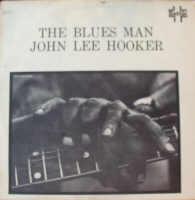
Daddy was handsome and famous up and down Hastings and beyond, with a gold tooth in his smile and a gold Lincoln Continental. He was many years older than my mother Shirley, his second wife.
My mother, far right, next to her sister, Lillian, visiting their Chicago cousins, in their dark suits on the left.
My mother’s Pentocostal church upbringing of the time allowed neither movies nor secular music; doubtless, the ceaseless excitment andnightlife of this exciting music man called Joe Von Battle, and his Hastings street shop, was mesmerizing to a young beauty who loved experiencing “the world.”
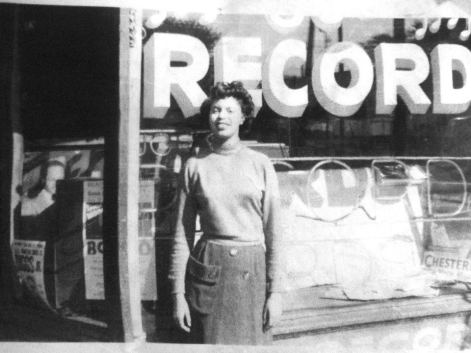
She was an music lover, though she never had a love for the Blues that was so dear to my father’s heart; she had more modern, popular tastes. Nevertheless, she worked at the record shop for several years before they married. Her good looks and musicality were as appealing to the customers as my father’s charismatic presence.
Suffice it to say before long, there was a scandalous overlap between my father’s first wife, and his relationship with my mother, though they eventually married. Despite all, I arrived in the world of my beautiful mother and her five beautiful sisters, and my father, a brown, handsome music man of local fame. My early years were spent in the bright rays of her beauty and his renown.
My father was a fast, entertaining talker – a real raconteur; a sharp-dressing man with a grade school education. He was a voracious reader who kept stacks of news articles and volumes of the classics, tales of the Iliad and Odyssey and Black history that he allowed me to read.
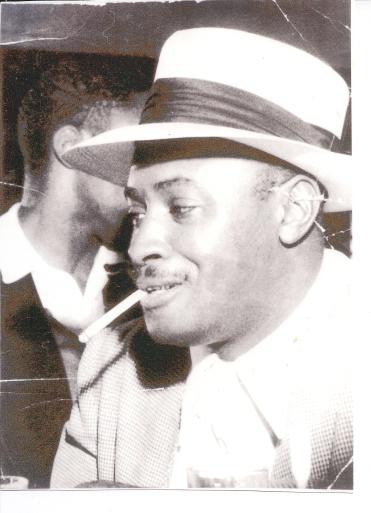
He was a lover of animals, keeping wounded birds, dogs, cats and any hurt thing that hobbled along on Hastings, and later on 12th, nursing them back to health – cooking his chicken and rice concoctions on a hot plate in the back of the shop.
He wrote and published songs but was never really a singer or musician. What he had was a magnetic personality, an ability to discern talent in others, a fascination with recorded sound – and a love of making money. He would record virtually anything that made music or noise. He was a dedicated provider his two families – four children and his ex-wife from his first marriage, and four children and his wife in his second, in the days before child support or welfare. Despite the breaking of his first marriage, his older children loved my mother, and loved us, the children of his second marriage; we spent much time together when we were growing up.
Joe’s charisma, love of hustle and desire to provide for his both families was such that when record sales were slow, he thought nothing of having his son Joe Jr. help him sell sugarcane, or even straw hats, at the front door. Maybe that’s why, in the record Hastings Street Opera, the Detroit Count rapped “…Joe’s Record Shop, you can get anything there but a T-Bone steak.”
Sugarcane – at Eastern Market 2014, the same as it was in the 1940’s and 50’s.
As his production of Rev. C.L. Franklin’s records grew, Joe’s Record Shop was associated with a Gospel radio show, sponsored by the highly respected radio personality, Senator Bristol Bryant.
The Gospel classic, “Precious Lord” by Rev. C. L. Franklin, on the Von label; photo from Ebay Seller AuralEffects
Joe Von Battle also purchased air-time for his own show, and broadcast from CKLW in Windsor Canada, across the river from Detroit, a station with a signal so famously strong that the shows could be heard throughout regions of the South. Each week the tapes from the show were delivered – often by Joe’s eldest son, Joe Jr. – to the station’s American business offices in the Guardian Building in Downtown Detroit.
With African-Americans moving from the South to the North, hungering for connections back across the Mason Dixon Line, Rev. C.L. Franklin and Joe’s Record Shop became mythical in thousands of Black households in the U.S., as they tuned in for the ritual Sunday night sermon and Gospel music.
[I was on the radio show myself. In elementary school, I won first place for a poem I had written, and I got to read it on the show – my media debut.]
My father’s shop was the place for hanging out, with folks like Jackie Wilson, impresario Sunny Wilson, B. B. King, and some of the last of the old “Blues Boys” – Sonny Boy Williamson, John Lee Hooker, Joe Weaver, Eddie Burns, Bobo Jenkins, Little Sonny, Little Willie John, and a who’s who of black music of the times, from the clubs on Hastings and in Paradise Valley.
Having fun in the back of the Hastings St. shop; my mother, at right in plaid, and her two of her five sisters, standing. My father is just out of camera.
Joe Von Battle’s success was real, with a magnificent home in Highland Park, where I grew up, a beautiful new stay-at-home wife, and a second family of four kids (of which I’m the eldest).
My parents’ lives, in the 50’s and early 60s, were filled with parties, clubs and horseback riding at Idlewild, the now historic all-Black resort in Northern Michigan, the only place of such leisure open to Blacks in the days of segregation. He was an avid golfer and, with my party loving mother, was a “Man about Town”. They lived a grand life for the times.
His eldest son Joe Von Battle Jr., as handsome as his father, worked alongside him after school and on weekends at the shop, since it opened in 1945, until having his own family and the lure of factory pay at Chrysler in the 1960’s pulled him away, to my father’s great grief. My brother Joe Jr., is another great storyteller with a near photographic memory, and has shared many memories with me, about those times.
Joe Von Battle, Sr.. and Joe Von Battle Jr.., family photo, in Joe Sr.’s Highland Park back yard.
In 1960, after Hastings street was urban renewed into the Chrysler Freeway, my father was forced to move his record shop from the East Side of Detroit to the West, across town to 12th street.
This massive shift was an historic urban migration, uprooting the community – including many Hastings business folks – from their entrepreneurial and residential roots – a destruction of generational wealth from which our community has never fully recovered. Many of them, having already survived the migration from the South, could not withstand yet another traumatic transition, and many African-American businesses were lost forever.
My father would go back to old Hastings St. as the freeway encroached its way North. His shop was gone, but a few holdouts remained, waiting on the wrecking ball. I remember we stood on the banks of the dirt-filled crevass, the initial diggings of the Chrysler Freeway. My daddy looked across, down into the giant pit, to the place where his record shop once stood, and he shook his head and said, “That used to be Hastings.”
The Record Shop moved from Hastings Street on the East Side, over to the West Side, on 12th Street and Pingree, then later, a few blocks away, to 12th Street and Philadelphia, where it would remain.
Business Card, reproduced in CD booklet, Battle of Hastings St., Ace Records.
The 12th Street Shop was not far from new Motown house called Hitsville, and though my father disliked the new sound – locked back, as he was, in his down-home Blues and Work With Me Annie taste in music – he was great friends with many of the Motown folks. Many of the Motown artists found their way to the shop for a “taste” and some conversation with Joe, too.
Mack Chimse, Washboard Willie and James Jamerson – who would become Motown’s bassist and Funk Brother. Album Cover, George Paulus Production
Here was the world of 12th Street of Detroit, with its intense daytime commerce and after-hours, huckle-buck nightlife; where men drove Eldorado’s with matching suits, and women wore wigs and smoked in public. But with all of its roiling activity, 12th street was not the same as the life on Hastings; although folks had come from Black Bottom, there was also a new, more urban population, many of whom disdained the old country blues that my father loved and sold records to back on Hastings St.
Joe’s Von Battle’s 12th Street Record Shop. From the collection of the late George Paulus.
In the midst of these changes, my father grew desperately ill, and no doctor could figure out the cause; he was becoming weaker by the day, and his skin, usually a pecan brown, was turning to a deep black. Finally, on deaths’s door, he found a new, young doctor who diagnosed him with Addison’s disease, a little known malady of the pancreas, that happened to afflict President John Kenny, too ( a fact of which my father was inordinately proud). He was put on new, miracle drug called “cortisone”, and was on this medicine for the rest of his life.
Though things were different, we became a part of the West Side life – we’d have breakfast at the Cream of Michigan cafe, daddy would drive a few blocks and get corned beef from the Jewish deli called Esquire, and we’d watch folks with fringed, spangled dresses and silk-and-wool suits, who had just left a night of partying at the 20 Grand and after hours clubs join the church folks having a bite before Sunday service.
II spent weekends and summers of the 60’s with my younger brother Darryl splicing tapes, reading Billboard and ringing up the latest 45’s, and mastering the art of discerning a customer’s request within a song’s first bar (an unfair music trivia advantage that we retain today).
I remember many a Saturday afternoon in the later days of the shop, affixing labels to records, unloading them from boxes, and always, playing all the music we wanted and doing the Shing-a-ling and Boo-ga-loo in the middle of the floor, to the delight of the customers and the chagrin of my father, who wanted us to get back to work and sell records (ignoring the fact that, dancing was the best way to sell them).
Joe Von Battle, in the doorway of his record shop on 12th St. A large photo of my younger sister in the window – he was proud of her good report card. Circa 1966.Photo by Mike Rowe.
Sometimes our baby sister and brother, Andrea and Lawrence, would come too, and Darryl and I – old and experienced pre-teens – would have to keep them from getting too exposed to the 12th street life. We’d spend all day dancing and playing the records the customers wanted to hear and buy.
I remember when I went “up North” with Daddy to the record pressing plant in Owasso, Michigan, or to Chicago to see the Chess Brothers, Phil and Leonard, where I listened to Bo Diddly masters – with Bo Diddly. Years before me, my elder half-brother Joe had sat in the Chess studios talking with Muddy Waters and the Chicago “Blues Boys”. I was a full-grown middle-aged woman before I understood that the box lunches my mother prepared for our trip were made because we could not depend on being able to eat at the roadside diners and rest stops, due to the still intense segregation, even up North.
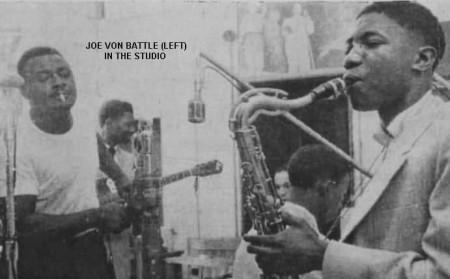
Joe Von Battle, left, in the studio on Hastings St., From Marv Goldberg’s R&B Notebooks website, The Thrillers. Photographer unknown.
Our father’s Blues friends were a part of our life. Wilson Pickett laid the sod in our front yard in Highland Park, taught my younger brother Darryl how to push the giant roller over the new grass. Famous blues men helped my father do repairs on his house, and shared a drink in the back yard, but to us they were all just Daddy’s friends from “Down South.”
On many Sunday nights, Darryl would go with my father to New Bethel Baptist Church, now on Linwood on the West Side, just like my father’s oldest son, Joe, before him on Hastings, dragging the mics and tape recorder in the big leather case to record the next homiletic masterpiece by “Frank”, as my father called Rev. C.L. Franklin.
After the mics and tape recorder was set up, my brother would sit behind the pulpit with the deacons, his legs too short to reach the floor, dangling from the big chairs on the altar. Then they all set to listening to Rev. Franklin whoop and sing and teach the urban Gospel (though often, my little brother would fall asleep in the middle of the making of music history).
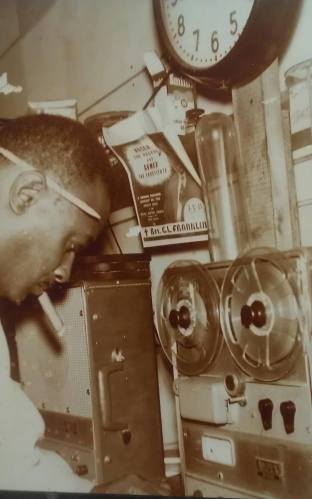
Joe Von Battle at his reel-to-reel.
My father recorded everywhere, obsessively; in the back room of the shop, in pulpits, in the streets, in our living room – once I came home from school to the sight of his amps and mics trained on man called Washboard Willie playing the – you guessed it – in our back yard. This, to cool, pre-teen me, was an act of bumpkinism that embarrassed me to no end in front of my Beatles and Motown loving friends.
I spent most weekends and summers working at the record shop, during the tumultuous years of cultural change, and cataclysmic shifts in music. Album covers were my windows on the musical world, and I spent hours studying them, and puttering around in the behind-the-counter chaos of plastic red and yellow disks, red and green Scotch tape boxes and slotted metal slabs for splicing tape.
Joe Von Battle, after the move from Hastings, in the doorway of the 12th Street Shop, early to mid-60’s. Photo attributed to Mike Rowe.
As the 60’s progressed, the trends in music had clearly changed in the Black community, and less customers asked for Blues and the old music. Motown – “The Soundtrack of Young America” – the new Soul music, Rhythm and Blues – and even Rock ‘N Roll – were now what customers wanted. This was all to my delight at the record shop turntable – but to the chagrin of my father, who still insisted on trying to to sell the Blues. On Sunday mornings he still – defiantly – played the old Gospel for the passersby, who were increasingly listening to the “new music” and leaving the old sounds behind.
The inroads of the big record sellers also took it’s toll. I remember walking with my father through Sears and Roebucks in Highland Park, where there was a “new, improved” record department, chock full of many of the records he was trying to sell on 12th street – and Sears was selling them at a much cheaper price.
To our shock, there were rows and rows of Black music, which years before, Sears and other big sellers would never have handled in such quantities, calling it “race music.” My father became a broken man – at home and at work. At the time, I didn’t understand his grief and fury, the fact that we were in the maelstrom of the destruction of the independent record sellers and producers of that era.
JVB and my mother, Shirley, in our Highland Park back yard (our dog had busted through our back fence). Mid sixties. My father’s skin had turned dark, from Addison’s disease.
To add to this commercial and musical threat to Joe’s life’s work was two afflictions – Addison’s Disease, and chronic alcoholism. The many “tastes” in the back room of the record shop and at the bars on 12th street had long before morphed into full-blown alcoholism. My mother’s love for parties and the Twenty Grand club took it’s toll, as well. If my early years were spent in their amazing, musical life, by the time I was in middle school, the parties that they loved had turned into the insanity of drink and vicious marital wars.
My brother Darryl and I, young teens, ran the record shop on the weekends in those days, aware that our fun, weekly chore was now helping to keep the shop alive. My father was a shell of his former self; tormented, tormenting and addled by drink; our family suffered mightily.
There were record collectors who acquired records and materials from Joe during that time. There were also record sharks in the business, who moved in to take advantage of his decline and his desire to share the music of his life – as well as his need to support his second family. Some acquired masters and tapes less than scrupulously, as he weakened.
The beginning of the end came on July 23, 1967; a wave of destruction and police violence made it’s way down 12th Street, to become Detroit’s 67’ Riots – also known as The Rebellion. My father’s record shop was in its path. But that is a whole ‘nother story.
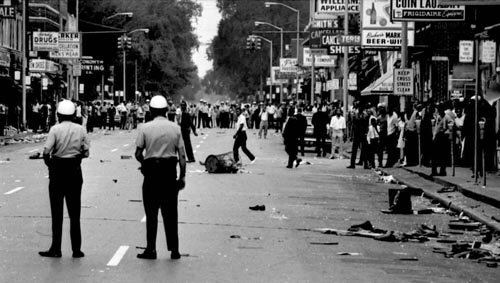
12th Street scene during ’67 Riots. Joe’s Record Shop in foreground outside of view, right side side of street. Iconic Stock photo.
I think that Joe Von Battle really died the day he returned to his shop, to trudge through mounds of charred and melted records and fire-hose soaked reel-to reel tapes, unwound and slithering like water snakes; thousands of songs, sounds and voices of an era, most never pressed onto records – gone forever.
He was never the same, and neither was our home-life. But he wasn’t actually pronounced dead until 1973, doubtless from complications from the Addison’s disease that he had for years, and from more than a few “tastes” too many in the back of the shop, at our backyard bbq’s, and increasingly, after the loss of the shop, just ceaseless drinking at home on the couch.
A long time friend, Dave Usher (who was to become the manager of Dizzy Gillespie) extended help to Joe, allowing hm to work for a time on the ships of his family’s business on the river. But it was too late; Joe had never again “worked for another man” since he opened his shop in 1945, and in the bedraggled shape he was, it was not time to begin. My father drank himself to death, another broken hearted music man.
But even though music had moved on to the new Motown sounds and beyond, and even embittered with life and addled with drink, he always understood the importance of what he had done, what he had captured in those long, brown ribbons of celluloid tape. It was the ending of an era of African American music, and the beginning of another.
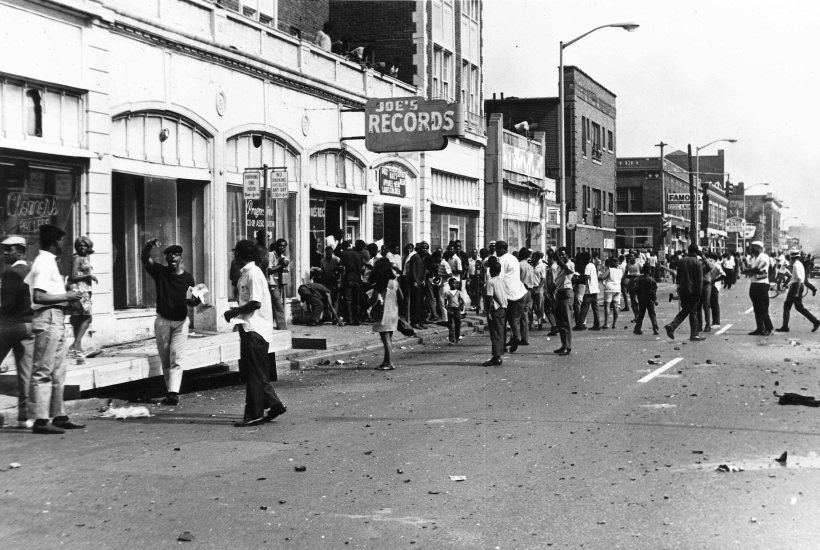
The looting of Joe’s Record Shop, photo by Detroit photographer Diggs, part of the Detroit ’67 exhibit of the Detroit Historical Museum
****
All of my life, I was accustomed to my father being called, “The Mighty Joe Battle“; in fact he often referred to himself that way, only half in jest. The late Famous Coachman, the grand Blues man of Detroit, always called my father “The Legendary Joe Von Battle”.
In Detroit, at the Charles Wright Museum of African-American history, there have been prominent displays of Aretha’s first record, on the JVB label, sometimes with words about Joe Von Battle, though few in Detroit have known much about him. I am always touched by these museum recognitions.
Early album by Aretha and her father, and the singer, Little Sammy Bryant – who was a ‘little person” with a big Gospel voice.
I have come to know, since I posted my father’s story, that even though he died in relative obscurity in Detroit, there is a significant number of collectors world-wide – in England, Holland, Australia, Japan, Wales, Spain, etc., who are well aware of the work of Joe Von Battle, and very knowledgeable about his voluminous recordings and discography. My father’s records are now collected and sold in auctions online, some highly coveted and worth hundreds of dollars for a single 45 (I cringe when I remember how we played frisbee with them without a second thought, back in the day).
I’ve run across re-issues of music my father recorded; a bittersweet accolade. Yes, it’s hard to see others produce this work for their own gain, but I’m gratified that there are those who value those sounds that he captured forever, over a half-century ago and are producing these records for collectors to enjoy today.
Joe Von Battle deserves special recognition for his role in recording the final songs and sounds as we changed from a people of the rural South into a new, urban community. He recorded the post-war sound of Detroit, and forever etched in vinyl some of the earliest works of those who became household names, as well as those whose music would never have been recorded but for him. May his musical legacy live forever.
In honor of the works and memory of my father –
The Late, Great, Legendary, Mighty Joe Von Battle.
Epilogue:
His 2 surviving elder daughters, Joanne and Peggy, returned to live in the South.
His younger sons, from his second family, live in Detroit: my younger brother, Darryl Battle, like his father, is a devoted true Blues lover and collector; the youngest, Lawrence Von Battle, inherited our father’s love of recorded sound, and is an expert audiophile.
His youngest daughter of the second family, my sister Andrea Kelly, also lives in the South.
There are many grandchildren, a number of them with some form of the name Joe Von Battle.
My mother Shirley, his second wife, passed away in early 2008. Her “Home Going” was at the old church that she had returned to in her later years, Zion Congregational COGIC, still known as “Mack Ave”.
The Pastor today is Elder James Hall, and among the many singing Saints in attendance, Pastor Marvin L. Winans, great-grandson of my mother’s first pastor, came back to join the Mack Ave. congregation – as he does, on occasion – and sang at her funeral.
The magnificent home that my father bought in Highland Park, where I was raised, and where returned to lived in recent years, burned in a fire in 2007.
Photographer Jacques Demetre is in his nineties, as of 20014, and still living in France. He remembers well his 1959 visit to Joe’s Record Shop in Detroit. The photos that he took became a part of his book with writer Marcel Chauvard, Voyage Au Pay Blues – Land of the Blues – in French and English.
I’m writing a book about my father, and about growing up in the record shop. I have lived all of my life in Highland Park and Detroit, and today, I live in the neighborhood created when Black Bottom was destroyed, within blocks of the place where Joe’s Record Shop on Hastings Street once stood.
Marsha Music, Detroit
[My thanks, especially, to Joe Von Battle Jr. and Darryl Battle, and to the Battle siblings through the years, for sharing their memories; without them my efforts to pay tribute to Joe Von Battle’s legacy would not be possible. Thanks to writers Dave Marsh, Craig Werner, General Baker and the others who have encouraged me to write and tell my stories, over the years.
More recently, many thanks to Paul Vernon, Joe Louis, Stefan Wirtz and members of the Real Blues Forum, on Facebook, for their diligence in tracing the recording history of JVB records and sharing so much information with me. And a thanks to Mr.Dave Usher, a long-time friend of my father and fellow music producer, who came to my father’s aid in his last years.]
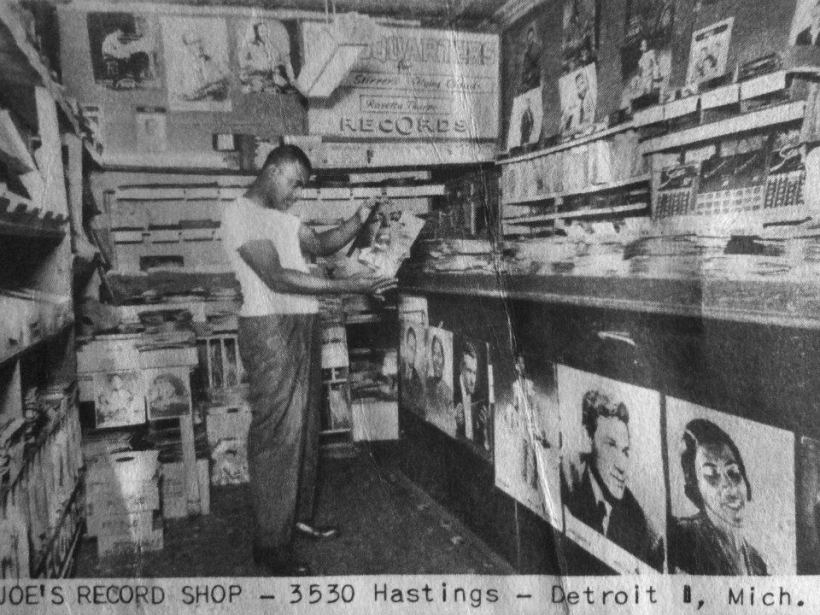
Photo of Joe Von Battle in his 12th Street Record Shop, surrounded by records – image from a postcard advertisement. Approx. 1945.
Below, record enthusiast Ken Flaherty Jr., talking about Joe Von Battle before a presentation by Marsha Music, at the Green Garage in Detroit; That’s Marsha Music with the occasional question in the background.
Discography of JVB label:
https://www.discogs.com/label/157844-J-V-B
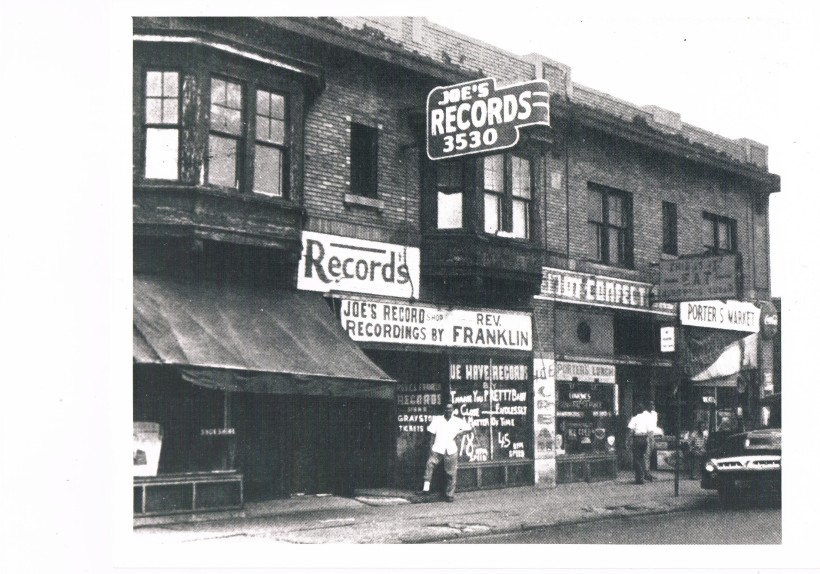
Joe’s Record Shop on Hastings Street, photo by Jacques Demetre, 1959
Essayoriginally posted November 2008; Copyright; all rights reserved.
Marsha Music on Facebook: https://marshamusic.facebook.com
Or leave a comment below
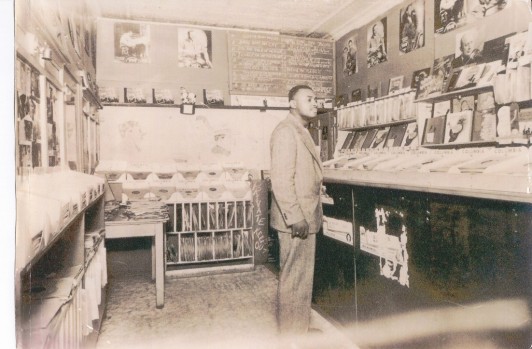
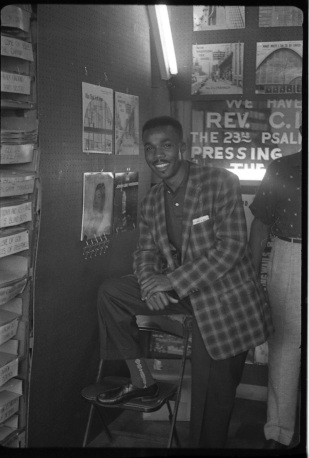
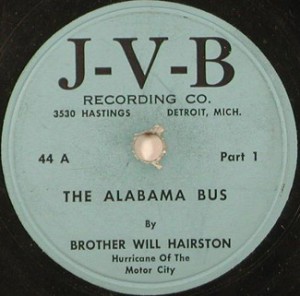
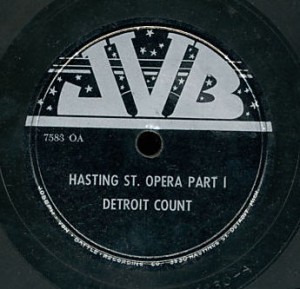
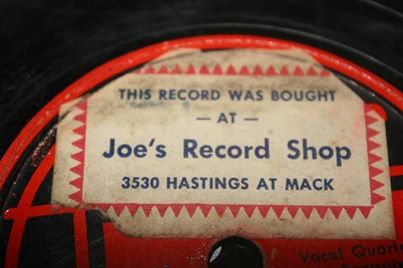
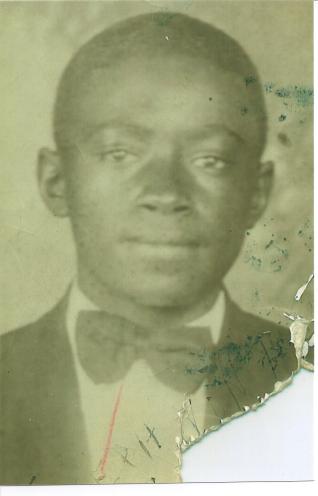
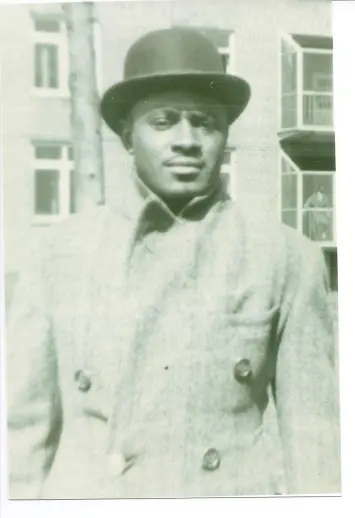
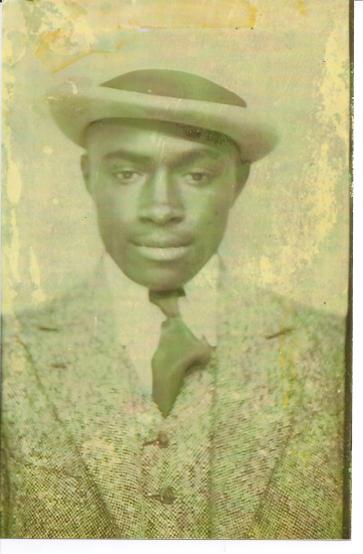
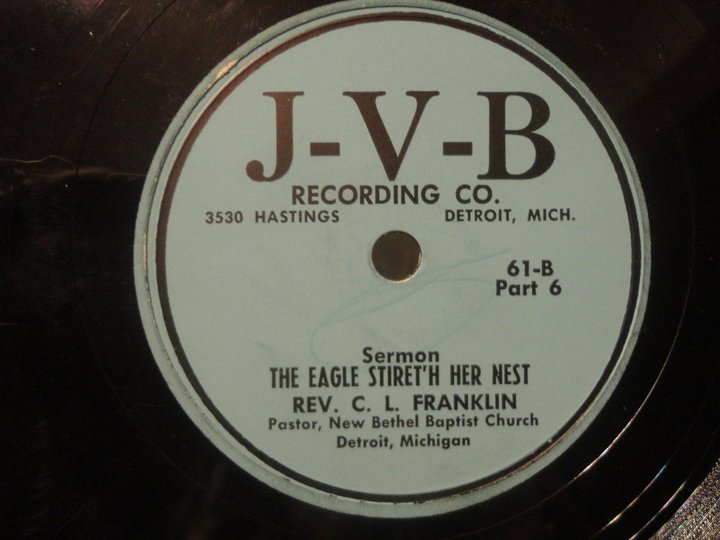

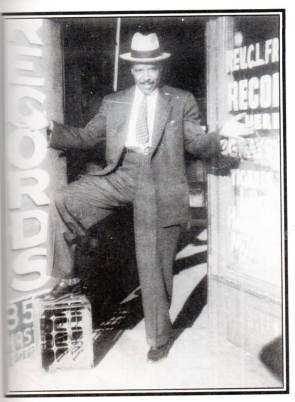
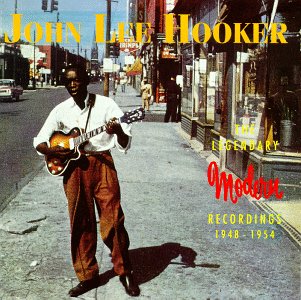
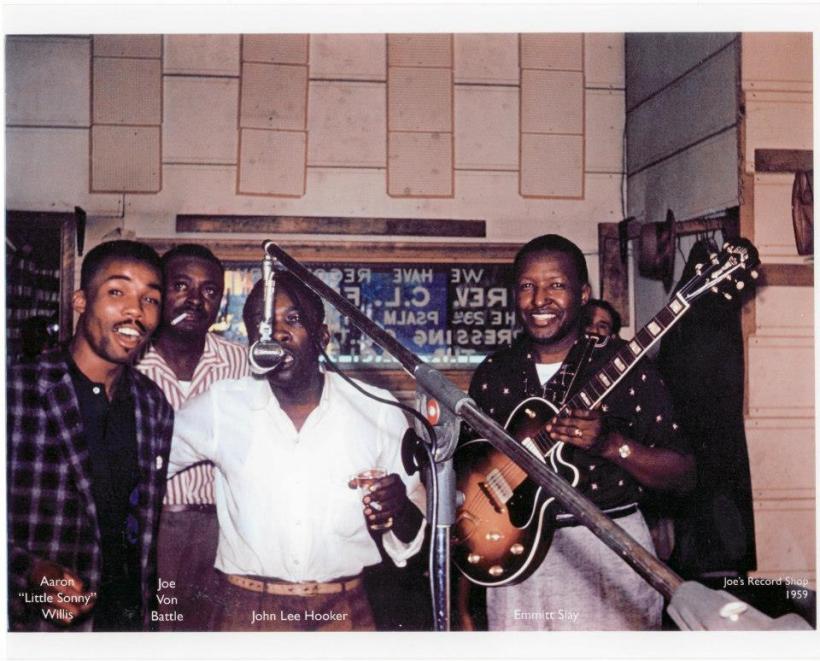
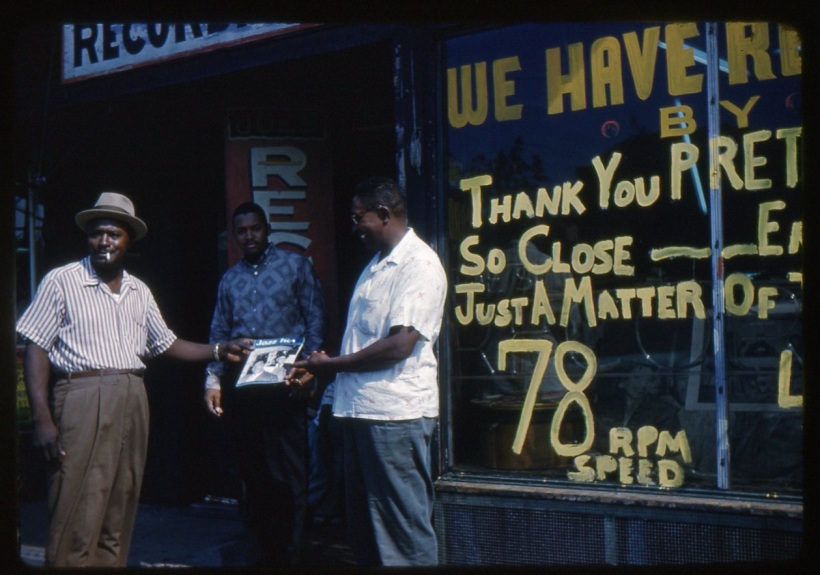
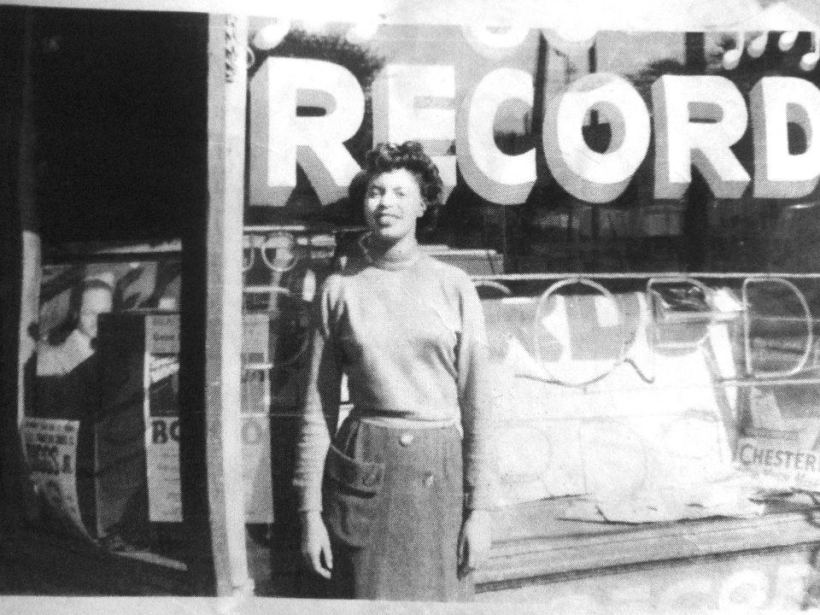
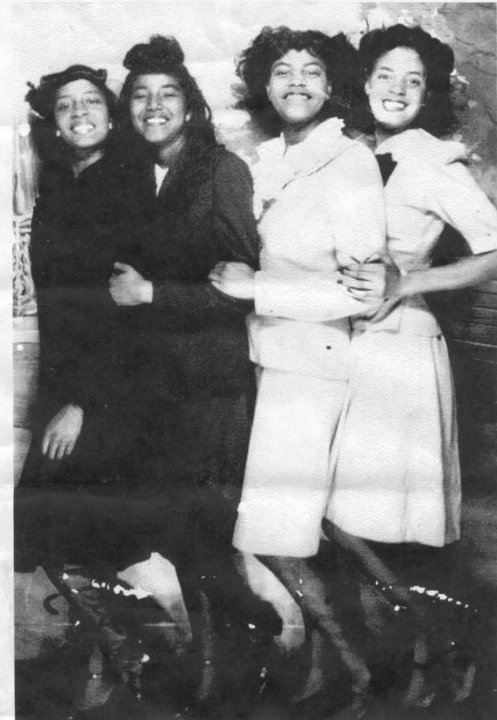
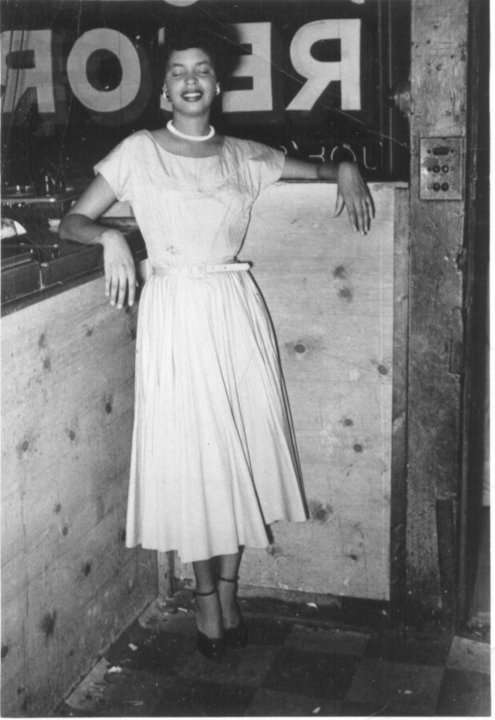

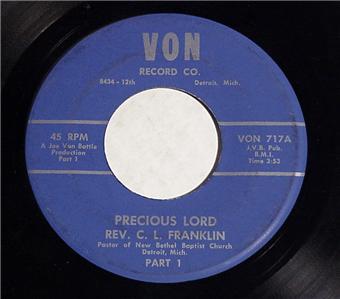
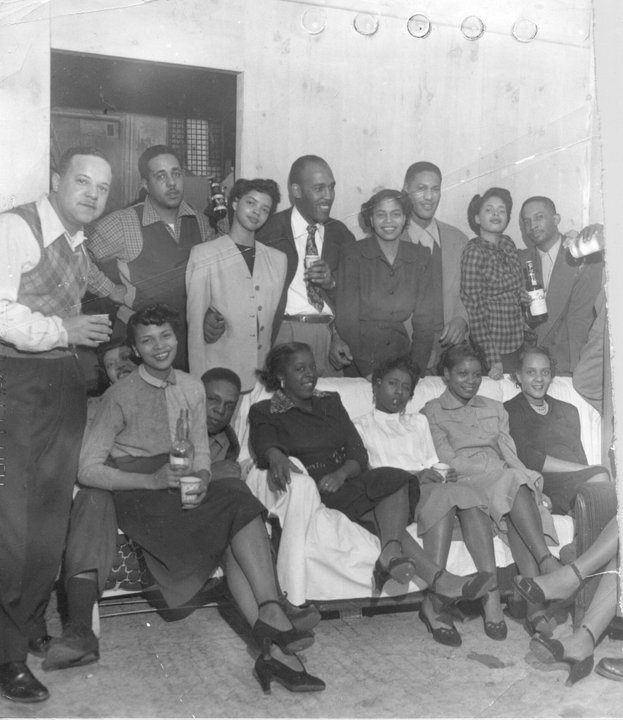
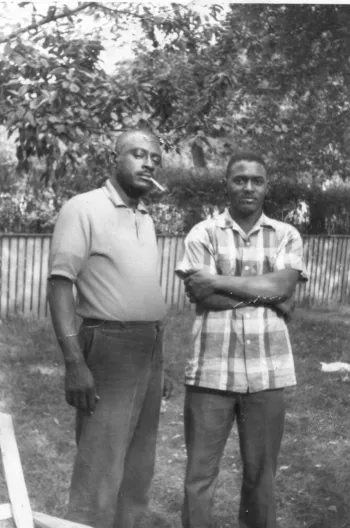
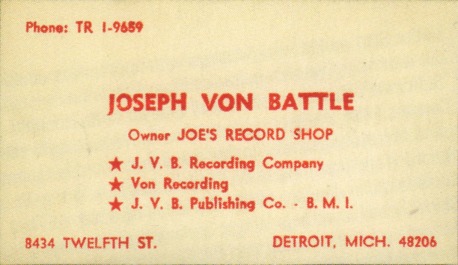
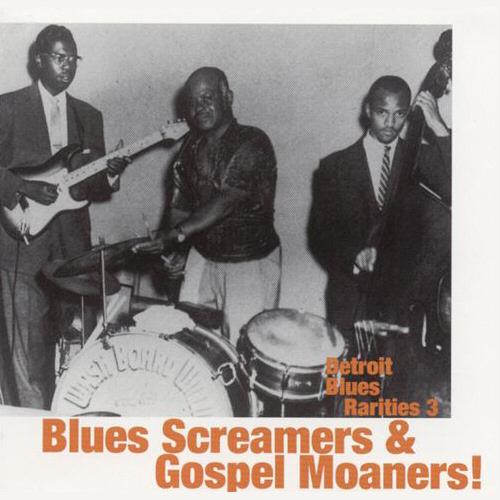
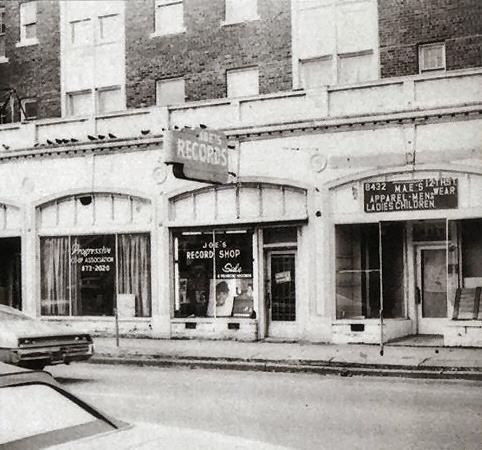
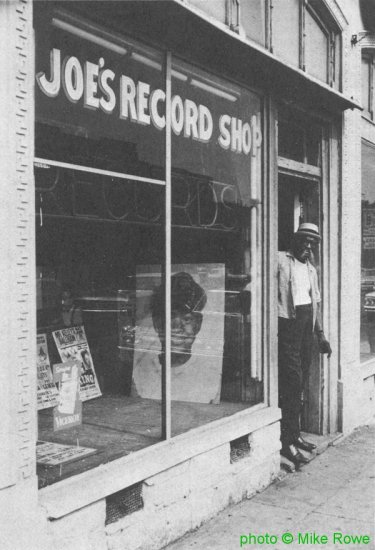
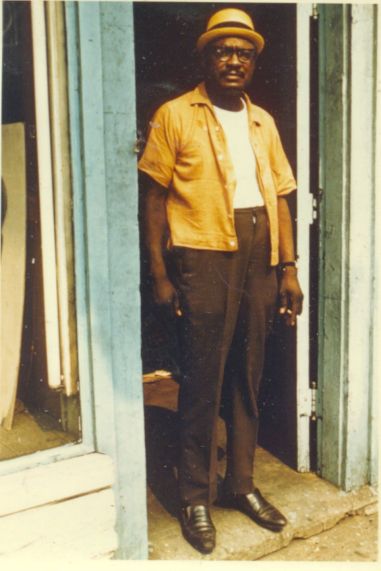
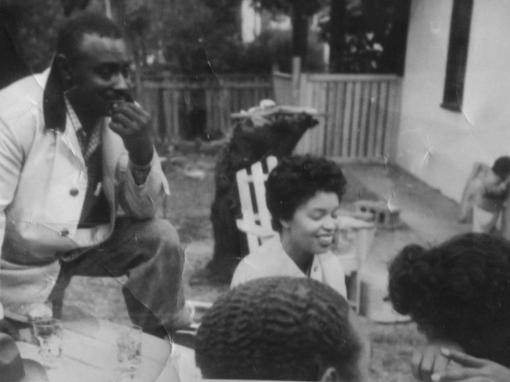
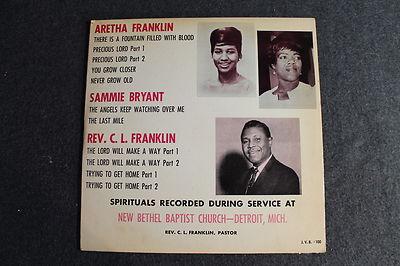
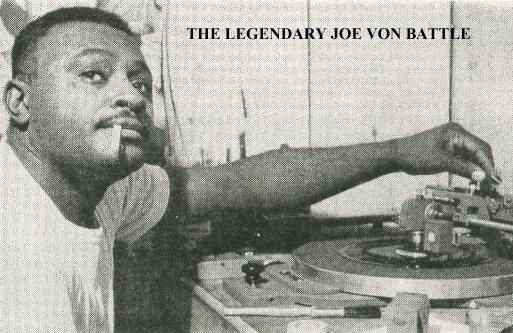
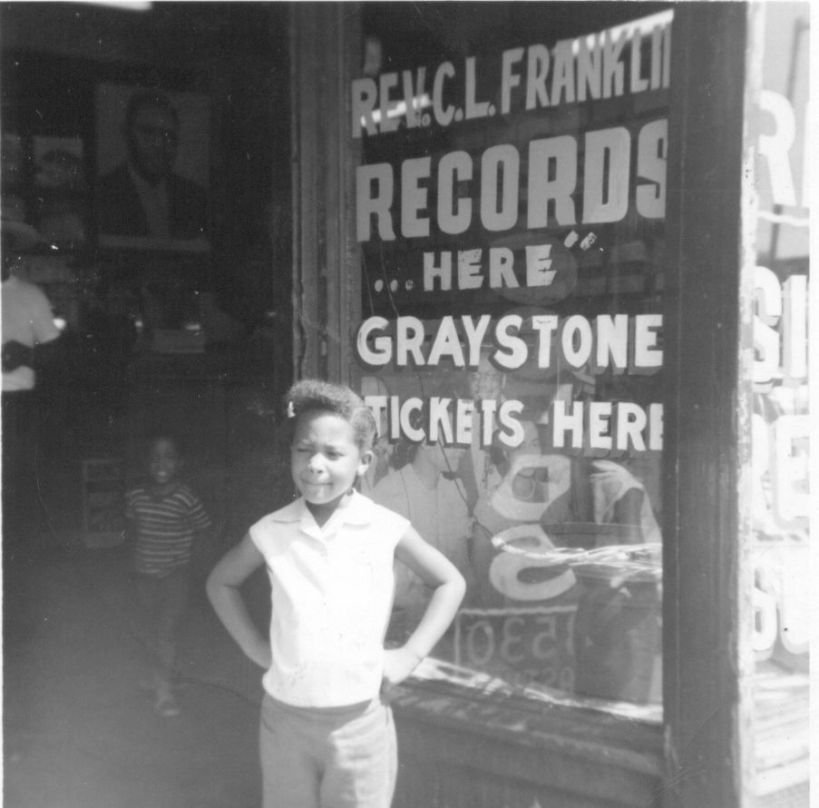
November 18, 2008 at 10:48 am
COMMENTS FROM HILDA V.
Marsha, what a great account of your father’s record dynasty. You have documented an important period in the evolution of the music business in Detroit.
My husband and I used to join our friends on occasion to see Washboard Willie perform at the Calumet, which was known as “the Met.” It was considered edgy to go there, so you can imagine the fun we had drinking and watching him stroke the washboard with thimbles. I often wondered why no one had written about his time and contribution to the Blues scene in Detroit.
I am so glad to see that you are documenting that period in our history, for you touch on so many aspects of our culture.
We remember, also, Bristol Bryant. I believe he was a disk jockey on radio, and I think he married a woman who used to work with my sister at Children’s Aid on Warren. Your account is a very personal one, and you paint a graphic picture of your parents and of yourself. You should definitely publish this, because, as you know, music has played such an important part in the evolution of Detroit.
I commend you!
November 18, 2008 at 11:00 am
My Thanks to Hilda V. for her kind words and her memories. I am honored that she is the first to comment on this article about my father.
I’m sort of surprised that she knows about Washboard Willie, he existed as a sort of blues leprechan in my mind, almost as if I imagined him, with all of his drums and percussive instruments played at one time.
That washboard was just the funniest thing when we were kids, but now I know he was a serious musician and accompaniest to many blues artists. I do remember that he was a nice man.
Someone was just telling me last week that a woman was playing the washboard at church!
Anyway, Hilda, thanks so much for your comments, they contribute to our collective memories of Detroit.
Marsha Music
November 19, 2008 at 5:32 pm
As a white guy born in the mid ’50s in the UK, this article just blew me away.
When I was a young kid, I started getting into soul, Motown and so on. When the artists came to England in the ’60s — Otis Redding, Martha & The Vandellas, The Temps, Smokey etc., they were all treated a royalty, stayed at the best hotels and so on.
Only when I came to America in 1991, did I begin to hear about this or that artist who could not stay in this or that hotel, and the Civil Rights movement generally.
To read this article was like being on a roller coaster ride to the point where I actually felt I was “inside” the record store. I’m not so much of a blues fan but seeing the labels of Rev. C. L. Franklin 45s and the association with Chess
made everything come alive. I began salivating about all the tapes and as a record man, imagined them lying around in some dusty attic. The roller coaster ground to a halt when the vivid description of 1/4″ reels slithering like snakes, brought me back to reality with a bump.
I can understand why your thought your father “died” that day. But thanks to this article, I’ve learned what a major player he was in the Detroit music scene of that period.
So thanks, and keep writing.
November 21, 2008 at 4:18 am
Reply to Paul Williams from Marsha Music,
Paul, your comments are awesome. I loved your first-person account of the arrival of Black Motown/Soul acts in the U.K.
I’m glad I was able to give you a sense of what it was like around “The Shop” in those days. I have thought about publishing the next part of this story on these pages – what is was like growing up “in a record shop”. That is a whole ‘nother story.
Regarding the stash of records you had imagined existed somewhere: I believe that the lack of such a “new old stock” goldmine from Joe’s Record Shop is what has contributed to the value of many of these records. There has not, nor ever will be, a cache of undiscovered treasures – from our shop at any rate – dumped upon the collector’s market.
When I think about how my brother and I played Frisbee with Lps and 45s……
I thank you so much for your thoughts and words of encouragement. I hope that you do more writing too, for you have an excellent “voice”, and doubtless, your own musical stories to tell.
Marsha Music
December 25, 2008 at 8:45 pm
Marsha, you are an awesome writer! I felt like I was right there with you at the record shop, the Motortown Revue, and the Isaac Hayes concert. Your Dad was a very important part of Detroit music history, and I’m glad that you are writing a book about him. Until now, very little information has been available about him. The next time I come to Detroit I will drive down Rosa Parks Blvd. and look for the intersections of Pingree and Philadelphia to see where your Dad’s store was. You were blessed to have grown up at that special time in Detroit. Many thanks for sharing your memories with us music fans.
December 29, 2008 at 7:09 pm
Marsha replies to Tim:
Thank you!
Tim, you are right, there is a lack of historical information “out there” about Joe Von Battle. Generally, he is only mentioned in accounts on music in Detroit, such as Aretha’s autobiography, and books on C.L. Franklin and on music in Detroit, though the authors clearly regard his role as pivotal.
There are many elderly Detroiters and record folks who remember well his presence and influence in Detroit back in the day, though of course, as time goes by, their numbers diminish.
There is a desire in the record/music community to know more about him, with writers piecing together what they can from discographies and the limited anecdotal sources available to them.
I remember on several occasions, in the ‘60s, journalists from Europe, fascinated with my father and the music, visited the 12 th Street shop, demonstrating the interest of those from “across the pond”. But that interested was not demonstrated in the same way here, until more recent years.
I began writing about my father on a few websites about 12 years ago and yes, I’ve been “working on” a book about him for some time. I am – understandably, I hope – protective about the presentation of his story, but I decided to publish this summary of his life and contributions for this blogsite.
___
The intersection of Pingree and Philadelphia, at the place where my father’s second (and last) 12th Street record shop stood, is now a barren corner. For despite the intelligent and valiant efforts of the community leadership to re-develop the area after the ‘67 Riot (including building a shopping center/strip mall) the neighborhood has never been fully redeveloped.
Grass and sidewalks now inhabit the places where the businesses and the houses on the blocks on the east side of 12th Street once stood; they were the mostly large, attractive brick “flats” and single homes, part of Detroit’s once famous, substantive housing stock.
____________
Yes, Time, I grew up in a special time. My book is not only about my father, but about what it was like “growing up in the record shop” during that era. I believe that there are many others in Detroit who should tell their stories about their parent’s special contributions, and their own unique experiences during such transformative times in Detroit.
Let me know if you come to Detroit! Thanks for writing and for your encouraging words.
Marsha Music
January 7, 2009 at 8:07 am
Excellent and interesting article Marsha, great photgraphs too!
JVB’s recordings are among the greatest Detroit blues recordings ever issued and are very much revered by blues fans and blues/R&B record collectors in the UK and Europe.
Best wishes
Tony Burke
Blues & Rhythm Magazine
UK
January 7, 2009 at 5:07 pm
Hi Massha,
I’ve found a Joseph Battle (age 4 8/12) in the 1920 Census. He is living with his mother Laura and siblings (Charlie (age 11), Willie (9), Nettie (7)). If you think this is your father, I could send you a jpg image.
eRIC
Pingback: Joe Von Battle & Hastings Street « Blue Source Publications
January 8, 2009 at 2:20 am
Marsha replies to Eric.
Wow….what can I say?!!!! Those are certainly the names of my Grandma Laura and my father’s oldest siblings. I remember them all.
Wow.
Wow.
Well, let me brace myself; I’ve never seen a picture of my father as a child, or even a young man.
Please send to me at lingting2000@yahoo.com
Thanks!…and wow again……
January 8, 2009 at 12:51 pm
How great to see this page!
To me, Detroit music means the work of Joe Von Battle, not Motown. He was one of the legends of postwar blues/gospel record producers and was responsible for giving several now-famous artists a break in the music business.
Thank you so much for writing this story.
BJL
London UK
January 8, 2009 at 11:20 pm
Marsha replies to Tony Burke, above:
Thanks! I’ll accept that praise on behalf of my late father. He never thought much of the “new” music of the time and would be gratified to see your remarks.
I am aware of the value of his individual records in the record collecting world; though sometimes it seems to me as if they’re traded like baseball cards, with little regard for the music itself.
Obviously, that’s not true all of the time, and I thank you for your high praise.
Marsha
January 8, 2009 at 11:31 pm
Marsha Replies to Big Joe Louis,
[Sometime is weird about my posting and replies, they’re not always coming out in the right order; anyway I’ll write on.]
Big Joe Louis (reminding me of the Giant Fist, the statue of the arm of boxer Joe Louis that sits at the foot of the major avenue of Detroit, at the Detroit River). It is astonishing to me that my father’s legacy has traveled across the seas, though I remember, as a child, journalists from England and Europe coming to interview him.
I saw an awesome documentary in the last decade or so about lovers of blues and soul music in England, and I was socked at such interest in our music.
MarshaMusic
January 9, 2009 at 1:04 pm
What a superb account of a long and wonderful career…
Having been directly involved in the legitimate reissue of many of the tracks that your father sold to DeLuxe records, I can honestly reinforce the words of my friends and fellow Brits on here and say, with 100% conviction, that JVB was and remains as important to the evolution of black music in Detroit as any who followed in his wake.
You have every reason to be extraordinarily proud of his legacy…
Very best wishes,
TONY ROUNCE
ACE RECORDS LTD
LONDON
ENGLAND
January 10, 2009 at 2:19 pm
Hello,
This is a mail from Rien Wisse, the publisher of the quartely Dutch blues magazine BLOCK. I’d love to publish this article in our own language (Dutch) in my blues magazine BLOCK, which I am publishing since 1975.
The magazine is a hobby, not a business! I’d be happy to send you a bunch of copies when it’s out.
If you agree, it would be great. Any additional photo’s would be very welcome as well.
Looking forward to hear from you.
Yours faithfully,
Rien Wisse,
publisher
BLOCK MAGAZINE
The Netherlands
January 10, 2009 at 6:43 pm
Marsha Replies to Tony Rounce:
Thank you for your remarks. I have been proud of his legacy all of my adult life, however, it is now becoming clearer how highly he was regarded in the eyes of so many others.
Your company issued the CD, “Battle of Hastings Street” (pictured at the top of this blog) which I was startled to come upon for sale on the internet.
It was like a trip in a time machine when I played it and on some of the tracks I heard the plunkety-plunk of the very piano that I plunked on as a child. I could almost smell the chicken and rice cooking on the hot-plate in the back of the shop!
I thank you for your acknowledgement of my father’s importance, and for posting here.
Marsha
P.s.: As I pointed out in email, the man standing in the doorway of the record shop on the cover photo of the CD “Battle of Hastings Street” is not my father; but his Hastings neighbor, Clayton, a barber.
January 12, 2009 at 6:55 pm
Thank you so much for sharing your heartfelt memories of your father and the music of Detroit. When I was the editor of Living Blues Magazine in Chicago, I remember a couple of record collectors visiting your father and coming away with what must have been the last of his master tapes, which later ended up on various reissue LPs and CDs. I am now working with the Mississippi Blues Trail, which is a project to place historical markers at sites of blues artists’ birthplaces, homes, and gravesites, and other locations. We are honoring several artists who recorded for your father, including John Lee Hooker, Sonny Boy Williamson, Eddie Burns, and Elder Roma Wilson, who were all born in Mississippi. I read your thoughtful essay on Hooker and I’m wondering if you or your brother have reminiscences or photos of Sonny Boy, Burns, or Wilson that we could use on the markers? Thanks again. I’m looking forward to reading whatever you write next!
Jim O’Neal, Research Director, Mississippi Blues Trail
http://www.msbluestrail.org
January 18, 2009 at 6:19 am
I am in awe of this great work and of course your parents my beloved dearest Marsha.
It will take me quite some time to read and hear all the contents of this web site and thank you for giving me insight into a long gone time.
I have always admired you and I adore you even more now.
To steel a remark of the movie “The Colonel and I” where Danny Kaye and Curd Juergens played the main parts: IN THE CATHEDRAL OF MY HEART THERE WILL ALWAYS BURN A CANDLE FOR YOU.
Bless you forever my dear dear Marsha.
Ever your friend
Lord Arran
January 21, 2009 at 2:09 am
Dear Lord Arran,
We’ve been writing for years now on the Belles Lettres forum of thepurists.com; and you are one of my dearest cyber-friends. I thank you for taking the time to visit my site, and for your lovely words. Not everyone has a chance to have an English Lord as a friend, and I’m grateful for all of the encouragement you’ve given me in my writing, over the years, from across the seas. Thank you!
January 26, 2009 at 2:13 am
Hi Marsha, did Berry Gordy record any music of his or the act he managed at your dad record shop before Motown or in the early stages of Tamla. It was mentioned he did on another website but I can’t find anything to back that up and your website only mentions that Berry would come in and talk business with your dad.
Thanks, Tom
January 26, 2009 at 3:24 am
Tom,
I seem to think I saw this question from you before; I was trying to take my time to answer, as I wanted to be as sure as possible.
As far as I can find out at this time, Berry did not record at the Shop. However, relative to Gordy, in the beginning of his carrer, my father would have been an elder statesmen of records, so to speak, and Berry often came to talk record talk, as I said in the article, ask questions, talk about artists and all kinds of things. My elder brother Joe confirms this. This would have been at the Hastings Street Shop. Many early pre-Motown artists came over to the shop to hang out, listen to records and some did record stuff, mostly, I believe, with other artists. Jr. Walker and James Jamerson come to mind.
Mary Wells, Earl Van Dyke, Ivory Hunter and many others, came to both of the record shops to “hang out”. Later, Joe’s Record Shop on 12th Street was just blocks away from what would become Hitsville.
Now given all of that, it is POSSIBLE, and perhaps even likely, that Gordy might have recorded at Joe’s Record Shop in the very beginning of his career, but I cannot confirm this and therefore, I will not tell you that he did. Perhaps I’ll just find a way to ask him. :-).
Thanks for your interest.
Marsha
January 26, 2009 at 7:04 am
Hello Jim,
It has taken me many days to reply to your thoughful post, which also contains much information about your important work in the field of Blues music.
I took my time, because wanted to take some care in how I commented upon your recounting of witnessing the “coming away with” of my father’s master tapes. I thank you for sharing that recollection. It is difficult for me to see this in print, as it brings back painful memories of my father’s later, difficult years.
My father was notoriously generous and often gave away records – though not tapes or masters – to the interested young blues fan who were coming to Detroit from even around the world to get a touch of the Blues and Gospel spirit.
Over time other individuals were the recipients – through means legitimate and otherwise – of my father’s recordings and masters, from Chess Records to collectors – some who acquired music at firesale prices at times when his need to feed his family was acute, and some who who took advantage of my father’s sick and weakened state in his later years, and virtually “took” recordings from the shop. There are re-releases of his recordings in the market today; some maintain their legitimacy and some, doubtless, are being re-released with no provenance that would stand to a challenge.
There were also the vicissitudes of life that found my father in desparate circumstances – hundreds, if not thousands of records were left behind, in the move from the Hastings Street Shop to 12th Street, as my father simply didn’t have the wherewithal – in such a forced march, as it were – to move all of them.
A reader of Marsha Music emailed me that many collectors dream that there is a “cache” of JVB somewhere; but if there is, I don’t know where it is. However, that trove of treasures that I just learned about sure fits the definition, though it was likely dispersed many decades ago. Also, it is possible that there were records – probably in boxes – that survived the destruction of the 12th Street shop, but again, even that was over 40 years ago.
Regarding the markers for your Blues Trail. I looked at your website and it appears that it is a remarkable endeavor that you are involved with. A family member might have more photos for your markers, but none that I have the ability to acquire at the present time. I will email you further about this. On second thought, as I look at your description of your project, seems like Joe Von Battle should have a marker, too. 🙂
Thank you very much for your comments, and your encouragement.
Marsha
January 27, 2009 at 6:08 pm
Thanks Marsha, I emailed you the same question but I wasn’t sure the email was correct and then I found your blog area. I found the info about Berry and early Motown recording at your dad’s shop on the Hastings / Paradise Valley tour website – http://www.paradisevalleyblues.com/tour/hastingsindex.html which is a pretty cool website about the area.
Thanks, Tom
January 28, 2009 at 2:46 am
Thank YOU Tom,
I loved looking at the pics on that forum, paradisevalleyblues.com, the “tours” of the old streets. It’s kinda of weird though, since most of the sights of interest are gone. I didn’t see any mention of a Berry Gordy connection, but maybe I didn’t get to that part yet. Please email me with a link, if you find it.
I posted on that site several months ago; there’s a Hastings Street forum. However, it doesn’t seem to have taken off as a real discussion place. I’m going to add that site to my blog roll, I like it a lot.
Anyway, thanks for stopping by, Marsha
January 30, 2009 at 4:15 pm
Marsha,
What a beautiful article. Your Dad contributed so much to Detroit’s glorious music history. Thanks for putting some of your thoughts in print, it is so easy for information like this to fade away…
I’ll put a link to your website on detroitmusichistory.com. We have some articles about Detroit jazz history on our website. Thanks again for the great article!
Pingback: Big Road Blues Show 2/1/09: Detroit Blues - Blues From The Motor City | Big Road Blues
February 6, 2009 at 2:52 am
To Jim G,
I am very happy that you have stopped in and left such kind words. Your book, Before Motown, is a very serious work on Detroit’s contemporary musical roots, and one of the few that highlighted Joe Von Battle and his shop. When it was published, it was one of the few times that I had ever seen my father’s photograph in a book, and it was very gratifying to me. I enjoyed your site, too. Thank you very much.
Marsha Music
February 16, 2009 at 1:59 am
Hi Marsha, just wanted to get back to you about the Paradise Valley Blues website. If you take the Hastings Street tour on the home page you have to travel up Hastings to where he gets to Hastings and Mack (at least 12 clicks or here is the link http://www.paradisevalleyblues.com/tour/hastings0390.html. That is where the site mentions your fathers shop and Berry recording some early Motown acts there.
Thanks, Tom
February 23, 2009 at 4:06 pm
Marsha–great job, I learned so much…and so much worth knowing, inlcuding the broken-hearted bits.
Deserves more prominent (and expanded?) publication.
Here’s hoping…
Dave
April 29, 2009 at 12:19 am
As a collector of Blues and Vocal groups I’d like to say how privilaged I feel just to be reading your blog and to have met Joe Jr. He ( Joe Jr. ) used to come over to my house to talk records with me,and we occasionally traded a few discs. I stayed on the west side near Livernois and Vernor at the time. Joe Von Battle is certainly an icon to record collectors all ove the entire world. The discs on J-V-B are legendary. My personal favorite is the Violanaires – Another Soldier Gone. Joe Von Battle will never be forgotten! Most sincerely, Bill Sowders
June 4, 2009 at 2:30 am
Thank you so much for this amazing history of such an important, but under-written about part of Detroit music history. I am an avid music fan and record collector and I cherish the J-V-B and Von records that I have found in the dust-bins of Detroit. As a fellow Detroiter, I thank you and your family for all that you have done to create and preserve the culture of our city, Thank you. Good luck on your book. I simply can not wait. You are an excellent and wonderfully honest writer. Perhaps the title of the book should be, “Hastings Street Opera!”
June 11, 2009 at 5:09 pm
I’ve really enjoyed your presentation. My great-grand folks of uncles and aunts go back to black bottom before the 1920’s. I love old pictures of Hastings street. I was born in 1963 in Detroit,Michigan. Coincidentily the demise of Hastings street happened at the same time when Omaha,Nebraska was obliterating their black commercial section. God bless you. I’m always open to old time pics.
June 27, 2009 at 3:06 am
Adam,
Pardon my taking so long to reply. Thank you so much for your praise and encouragement. I do have a title for the book, but it is not “Hastings Street Opera”, for his shops – and their stories – were on both Hastings AND 12th. Great idea though.
Again, Thanks.
Marsha
July 1, 2009 at 7:10 pm
Marsha, Marsha, Marsha – what a ball I’m having. You know I lived on Pingree between 12th and 14th until 10 years of age – used to love to sneak up on 12th st (I wasn’t allowed to be up there without an adult). Who knows I may have seen you and didn’t even know it was you – LOL)
Your Mom and Dad were an awesome couple (what a beauty she was)
Thanks so much for sharing that.
Love the picture of you in front of the “shop” with the sign that say Graystone tickets (my aunt’s home away from home)
July 9, 2009 at 5:10 am
Tonight with sadness I auction off some of my JVB 78s from my collection of 45 years on ebay…Too bad I didn’t read this article first. I might have kept them a while longer.
A powerful story I can relate to on a business and personal level..Many thanks for putting it together for all to read.
tom kelly
October 23, 2009 at 9:26 pm
Thanks for the beautiful & touching memories.
I remember the Von label from our record store on Livernois but was always told “that’s gospel”, kinda off limits for a jewish kid who was hooked on soul.
Of course, the story of your father and his label/store is not just about music or Detroit, but such an important part of our collective history as a nation and society. Thanks for keeping it alive.
October 29, 2009 at 5:20 pm
Marsha –
Thank you for your thoughtful words about your father. I was directed to your blog via http://www.metrotimes.com and comments by W. Kim Heron. As a musician in Detroit who has been blessed to work with artists such as Joe Weaver, Alberta Adams and Johnnie Bassett – your father’s legacy has been a source of great inspiration to me. I hope our paths cross one day…
February 1, 2010 at 5:32 pm
2-1-10
I am delighted to know that the real deal”roots”
of African American Culture,in Detroit,MI is finally
getting to be told about a city that has been overlooked
for it’s contributions to the Arts and Humanities.It
is important that the true historical history of the
development of Rock’n Roll Music,created by African
American People,be told by African American People!!
Bill Nolan,Founder Rhythm and Blues Rock’n Roll Society,Inc.
March 8, 2010 at 3:32 am
Hi Marcia,
This is excellent. I am priviledged to read it. Thank you!
Janet J
September 10, 2010 at 12:37 pm
Goin’ Girl- I’m proud of You. Nicely put together, and the pictures really touch me.
Q
September 10, 2010 at 2:02 pm
Q! Wow, Thanks!
I’m thankful, as well, for all of your help with my early years of writing online!
Peace!
October 5, 2010 at 10:48 am
Wow, This blog is absolutely amazing!!!
This is how blogs should be really :prime information documenting local scenes…Real talk!
And real interaction with like minded people…ahhh i love this page too much!!!
Thank to Marsha and all the bloggers on this page for all of this!!!
x
Lexus
London SE1
Ps: You should check out this new Detroit Blues 3 CD compilation where Joe Von Battle’s productions are heavily featured:
http://futurenoisemusic.com/product.aspx?id=688
November 10, 2010 at 7:37 pm
Zimba, sorry for taking so long to post your wonderful words! I’m trying my best to paint the best word pictures possible to capture the landscape of this city. Thanks! I’m glad you like Marsha Music, keep coming back!
April 13, 2011 at 10:52 am
Great Article Marsha; I loved reading about your family and our Detroit history, thanks for this wonderful post! 🙂
April 27, 2011 at 2:06 am
greetings marsha,
i was just once again perusing your site and read of your father having recorded paul williams ‘the hucklebuck’ smash hit.
i sold not long ago a 1940’s promotional handbill booklet/program for the detroit paradise theatre featuring paul williams as headliner (w/ pre-comic geo. kirby singing).
khalid the person who acquired it for his travelling exhibitions has promised to get me hi-res scans of the piece.
would this be an image of use to you for your website or book?
the herald mentions the tune.
best,
tim
May 19, 2011 at 4:08 pm
Hi Tim; sorry for the late feedback! yes, if permission can be granted for use of the scans; I’m sure I could use it for my site. Thanks for thinking of it.
Marsha
July 22, 2011 at 4:53 am
Great blog, documenting some important times. Thanks for sharing.
Did your dad ever record any lap steel/sacred steel music to your recollection? It was popular with the Pentecostal church as you probably know.
July 22, 2011 at 1:22 pm
Thank you Matt. I don’t know if my father recorded sacred steel; but he recorded so MUCH music that it is possible. I’ll be aware of this as I discover more of his catalogues. Hope you visit Marsha Music again, please subscribe.
May 17, 2012 at 8:56 pm
Your memories of your father and the days on Hastings Street are a Detroit treasure. Thanks so much for sharing. Your father was a true pioneer in Detroit’s recording history. I for one would like to visit his grave and pay my respects if you would be so kind as to tell me where it is.
September 29, 2012 at 10:19 pm
What an incredible blog! God bless you Marsha…your Dad (R.I.P.) was a true immortal in Detroit music and he deserves to be remembered as such.
April 15, 2013 at 11:03 pm
Great to hear a version of this live on Sunday at MOCAD. Beautiful.
April 20, 2013 at 3:53 pm
This is certainly one of the most striking and thoughtful piece of writing that I’ve read about the blues in a big city. Congratulations. You’re a great writer. Without your father, the Detroit blues would certainly have not been so well documented and many great artists would have gone without being recorded. JVB’s legacy is great and essential for all the blues lovers around the world. So thanks to him and thanks to you.
May 24, 2013 at 8:52 pm
Hi Marsha!
I’ve just stumbled across this blog by accident and I must first of all say what a truly pleasant surprise this has been.
I live in the U.K. and have been amazed for years by the role your father played in helping to create and influence the music scene and cultural heritage of Detroit during the 1950’s and 1960’s when it seems music of all types could be heard from just about every street corner in the city.
Sadly, as I’m sure you are aware, there seems to be little formal written documentation of his influence in the city’s musical heritage hence my joy at coming across your website.
Do you know where I might find a listing of the recordings released on the various labels he was associated with? I have searched everywhere without any luck and hope you may be able to help on this.
I understand many of the future stars of Motown would hang out at your fathers shop on Hastings Street and I see iin an earlier post you have specifically mentioned Junior Walker and James Jamerson as being among those who visited it. Do you know if any of them actually recorded there?
I ask, as I have a recording on the VON label (no. 704) attributed to the All Stars. It’s entitled “2-2-5 Special” and is an instrumental track with a prominent saxophone that was probably released around 1961-62. I wondered if Junior Walker perhaps played on it prior to his joining Motown? If not, do you know who these All Stars were and if they recorded anything else? I have read a suggestion elsewhere that they may have tried out for Motown and possibly recorded an instrumental track called “Disintegrated”. Can you throw any light on this?
I hope to hear from you soon
January 29, 2014 at 4:23 pm
I really enjoyed reading about your family and the record shop, I came across this article by searching for record stores of the past and was reading about such stores in Michigan when I came across your post and the link to your story about Joe von battle and his contribution to music history, such a great story that would make a great movie…..all the best to you.
March 22, 2014 at 2:02 pm
Thanks so much for sharing the information about Mr. Battle. I found it very enlightening for all I ever knew about him was his owning a record shop on Hastings Street. Our families lived next door to each other in the Brewster Homes. They lived at 570 and we lived at 574 Mack.
May 26, 2014 at 12:09 am
Wonderfully interesting ………..I have two original 45s ….the All Stars on VON……..but the other is on Herculon label by Washboard Willie…….must be another JVB label don`t you think. Let me know if you wish to have a copy made for your collection. From the UK, Martin…………(Ebdon Fload on Facebook)
August 3, 2014 at 9:32 pm
Thank you so much for this. Marsha. My grandmother recorded with your father and I’m still trying to find copies or masters. Mamie Spann – precious lord. VON records
August 4, 2014 at 12:51 am
Hello Bruce; I remember the name Mamie Spann! Alas, I have no masters or copies. Thank you for reading my story.
November 28, 2014 at 2:04 am
Sorry for such a belated reply. I thank you very much for your kind words and your encouragement.
November 28, 2014 at 2:04 am
Thanks so much Shel!
November 28, 2014 at 2:05 am
I thank you so much for your kind words.
November 28, 2014 at 2:06 am
Thank you!
November 28, 2014 at 2:07 am
Sorry for my belated reply. Thank you for your kind words, and for you offer. I may take you up on it, eventually.
November 28, 2014 at 2:08 am
Thank you! I will let my older siblings know you have contacted me. I’m sure they’ll remember you.
November 28, 2014 at 2:09 am
Thank you! In fact I am working on a film treatment of my father’s story, a documentary film with cinematographer Juanita Anderson.
November 28, 2014 at 2:13 am
Please forgive my very belated reply. Thank you for your recognition of the rich pre-Motown musical history in Detroit, and for your kind words about my blog. I do not know the answers to your questions in particular, though I too think that was Jr. Walker. I do know that James Jamerson recorded there, especially with Washboard Willie.
I am working on compiling a complete discography of JVB’s recordings, and I will publish it.
December 27, 2014 at 10:56 am
This Detroit music history lesson is utterly marvelous. I am definitely re-posting this in the Planet Aretha group on Facebook!
December 27, 2014 at 6:53 pm
Why thank you very much!
February 11, 2015 at 4:56 pm
Joe was an inspiration to me and his work was like a blueprint for my own label, No Cover Productions, a Detroit blues label. I was honored to meet you and present you with a posthumous Lifetime achievement award for Joe’s work in the blues world (and beyond). I hope to hear from you and again I offer any help you seek.
Thanks and keep the blues alive,
Mike Boulan
No Cover
April 1, 2015 at 1:58 pm
Amazing site!!! Thank you so much. I treasure the music your father recorded! I have a numer of original JVB 45’s in my collection and they are some of my most prized possesions. The word legendary is a word that is often used, but it really does apply to your father and some of the great artists he recorded.
Pingback: A Grown Woman’s Tales of Detroit | First of the Month
August 23, 2015 at 12:23 pm
Hi Mike, sorry I’m just seeing your lovely comment. Please contact me on facebook, if you havent already done so.
August 23, 2015 at 12:45 pm
I will tell Joe Jr.!
October 17, 2015 at 4:12 am
I really enjoyed reading the story about your dad; it gave me more understanding of the legendary group that I have worked with over the last 38 years.
I remember Little Shot saying something about a Battle in Detroit, but I never understood exactly what he was talking about. I also remember eating breakfast at Frank’s Restaurant where a lot of singers gathered. We also have a young man singing with our group named Little Sonny and he has very little understanding of the legacy of the group.
Thank you again.
I found your father’s name in a book that had a write up about the Violinaires.
October 17, 2015 at 12:21 pm
So you are a Battle, too! Thank you for your comment. I’ve seen some very good youtube videos of the Violinaires in performances.
February 16, 2016 at 3:45 am
Wow! What a history lesson! I wonder if my grandfather who ran a printing shop ever did business with your father.
June 22, 2016 at 1:37 pm
Hi Malik! Sorry for this late reply. Thanks! If your grandfather’s printing shop was near Hastings St., it is highly likely.
March 9, 2019 at 11:29 pm
Hello Marsha and my sincerest thanks to you for telling your Father’s story. What a fascinating read! I adore how your family history and the history of our beloved Detroit intertwine. Here’s how I got here: My six sisters and I share a text thread where my sister Dorcas posted an article about little known Civil Rights supporter, Georgia Gilmore. There was an excerpt from an NPR show that featured the song, Stop The Alabama Bus I Don’t Wanna Ride embedded in the article. It was catchy. I wrote it down and Googled it after reading the article. To my joyous surprise it was recorded at JVB Recording Company on Hastings Street in Detroit. I thought, “A Civil Rights song recorded in Detroit! How awesome is that?!?” More Googling brought me here. I read with bated breath your informative, empathetic, proud family history. I am so glad to know this! I plan to share with many and delve deeper into Black History of my forever love, Detroit. Thank you so very much! I’d love to speak with you if you’re inclined. Best to YOU.
March 9, 2019 at 11:33 pm
Oh my goodness! What a wonderful message! It is gratifying to know that my father’s story, is reaching eyes and ears far and wide. I trust that you saw the page that I have on Bro. Will Hairston, on my website as well. God bless!
April 14, 2019 at 3:03 am
Marsha ….. this is just wonderful … your story of growing up and how you shared your dad’s story and most of all that you took the time to do this so we can get a feeling for the Detroit I sure didn’t know about. It’s a gift for all who read it.
April 16, 2019 at 5:16 pm
Thank you so much Emily Gail! I am honored that you liked my story about my father, and so glad that you continue to Say Nice Things About Detroit in all that you do.
Pingback: Antes da Motown: Uma história do jazz e blues em Detroit – ECO
Pingback: Celebrating Paradise: Akropolis Reed Quintet’s love letter to a lost Black cultural hub in Detroit - The Connecting Newspaper
August 10, 2021 at 5:26 am
Thanks so much for the article, joe’s recordings whether 78 or 45 rpm most sought after even going back to the 60’s in the UK (paul vernon sailor)turned many of us on to this man.but….sound “ouch” most pressings the wax /shellac comprised of &pressed from bus tickets&cow sh….sadly & even more sub-sound than the biahri bros “crown” albums.
August 13, 2021 at 1:32 am
I don’t exactly know what you mean, but thanks for reading.
August 13, 2021 at 1:46 am
Hi thnks for post am trying to catch up on other past posts of yours if as comprehensive as the Joe Von Battle.Rgds Rockin John
August 13, 2021 at 2:01 am
Hi Marsha well its down to the quality of the vinyl/shellac your dad had pressed, fabulous blues discs, but like I said bit like listening to records while “frying an egg”but the music was great! Mr Paul Vernon(sailor man) was a UK blues fan/collector/&writer who turned many young upstarts like me off the Strolling Bones &Yardbirds on to the r.e.e.l thang like your dads music/Chicago/Crowley &Lake Charles.I hope you can understand my past post a little bit better in the context it was meant with no disrespect intended.
August 13, 2021 at 3:19 am
Thanks for stopping by!
August 13, 2021 at 3:24 am
Thanks for explaining. No disrespect taken. I was curious because on many of the JVB’s I’ve heard, I’ve been amazed at the sound quality; clear as a bell, as if it was just made yesterday. But I can see there are some that don’t have that clarity.
Pingback: A freeway ripped the heart out of Black life in Detroit. Now Michigan wants to tear it down. - iNFO Vi
Pingback: A freeway ripped the heart out of Black life in Detroit. Now Michigan wants to tear it down. - Bridge Detroit
Pingback: A freeway ripped the heart out of Black life in Detroit. Now Michigan wants to tear it down. - Science Recently
Pingback: A freeway ripped the heart out of Black life in Detroit. Now Michigan wants to tear it down. - USVI News
Pingback: A freeway ripped the heart out of Black life in Detroit. Now Michigan wants to tear it down. — DigiNewsHub
Pingback: A freeway ripped the heart out of Black life in Detroit. Now Michigan wants to tear it down.
Pingback: A freeway ripped the heart out of Black life in Detroit. Now Michigan wants to tear it down. – Whistle LLC
Pingback: A freeway ripped the heart out of Black life in Detroit. Now Michigan wants to tear it down. | Engineering Recruiting
May 7, 2022 at 7:16 pm
Your father’s friend, Dave Usher, passed away on April 7th, 2022.
May 8, 2022 at 3:36 am
Thank you so much Scott,
I learned of this unfortunate news two weeks ago, and I am preparing a blog post now. He was a good man, and very dear to my heart.
May 9, 2022 at 6:19 pm
That is wonderful, Marcia. I knew Dave through my friend Annie Ross. I read your blog post about your Dad a few years ago and asked Dave about him. He thought the world of your father. I love your blog. Keep up the good work!
May 9, 2022 at 11:23 pm
Thank you so much! Yes, he was beloved to my father, and to my brother, Joe Jr. I had the chance to spend a day interviewing him for my film, Hastings Street Blues, and it was a once and a lifetime experience.